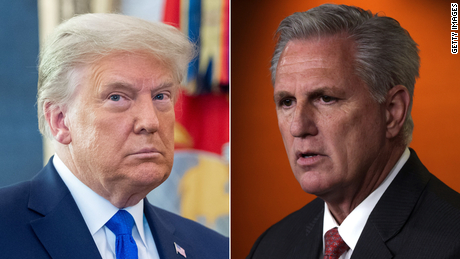The House GOP leader’s gesture shows his acceptance of Trump’s attempt to destroy the US political system
For Trump, there will be no political cost for multiple abuses of power. Quite the opposite, as he seeks to rehabilitate his reputation ahead of a possible 2024 presidential run that would itself be constructed on his “Big Lie” that the election was stolen from him.
“I enjoyed meeting with President Trump today,” McCarthy said in a statement after the meeting. “We had a productive conversation regarding House Republicans’ record fundraising, upcoming Congressional special elections, and the latest work being carried out to target vulnerable Democrats.” The California Republican added that he looked forward to working together as the midterms approach.
McCarthy’s earlier comments left little doubt that Trump’s legacy will be on the ballot in 2022 and even that the House GOP leader believes that bolstering Trump’s false claims of fraud is necessary for his own route to power.
Yet McCarthy is also taking a risk by pinning his own political dreams so firmly on Trump — and not just because of the ex-President’s capacity to alienate more moderate, suburban voters. Given Trump’s aura within the House GOP ranks, the minority leader is committing himself to any extreme tactics the former President may dictate in the months ahead. Any deviation from Trump’s course could potentially weaken McCarthy’s position in the House GOP conference as he works to build support to be elected as speaker if his party wins a majority next year. His fate is now in the hands of an ex-President who has a record of discarding political allies when they are no longer useful.
It’s notable that Senate Minority Leader Mitch McConnell — while avoiding outright confrontations with Trump and indulging his base — has made no effort whatsoever to reach out to a former President whom he sees as a liability.
New evidence of Trump’s threat
Someone vying to be speaker might, in a normal political world, be expected to protect the infrastructure of American political freedoms — like free elections, the sanctity of the US Capitol itself and democratic governance.
Yet McCarthy met Trump again following the release in recent days of horrific new footage of the former President’s supporters invading the Capitol and attacking police officers. Hours before McCarthy arrived in Bedminster, new disclosures emerged about how the top generals in the Pentagon had settled on a strategy of rolling resignations in order to protect the rule of law and democracy if Trump attempted a coup.
By continuing to treat the ex-President as the de facto leader of the GOP despite such abuses of power and offenses against fact, McCarthy is leaving a strong impression that his political hopes take priority over the integrity of the US political system.
In meeting the ex-President, McCarthy might be reflecting the preferences of the overwhelmingly pro-Trump base of the GOP. And given the power of the ex-President among that bloc, he is probably making a shrewd if transactional political calculation about the best way to win the House back next year.
But he’s also ignoring one of the key functions of the legislative branch: holding the presidency to account.
He is, after all, mulling whom to nominate from the GOP ranks to the select committee on the January 6 insurrection.
He has already genuflected once to Trump on the issue — derailing a bipartisan House compromise on an independent commission to investigate the assault on the Capitol.
A source familiar with the meeting on Thursday insisted neither the insurrection nor the committee came up. But it would be no surprise if the House Republican leader now selects lawmakers to Trump’s taste who might turn panel hearings into the kind of partisan televised circus the ex-President will enjoy, which would further hamper a national accounting of the outrage.
McCarthy’s refusal to forswear his relationship with Trump and his decision to repair it is the latest troubling sign that vast swaths of the Republican Party have turned their backs on the standards and obligations of democracy.
The attempts by McCarthy and McConnell to prevent a bipartisan commission — as has happened after major national disasters like the 9/11 attacks and President John Kennedy’s assassination — do not just shield the abuses of power of the former President, they also preclude a major national reckoning on events that shook America’s democracy and the establishing of agreed-upon facts necessary to make an accounting for history.
“This is what I find very disturbing about Mr. McCarthy visiting Mr. Trump,” said Timothy Snyder, a professor of history at Yale University and author of the book “On Tyranny: Twenty Lessons from the Twentieth Century.”
“That’s all about strategy, that’s all about tactics, that’s all about confusion. What we need is to lay down what actually happened. Every American should be able to agree about that,” Snyder told CNN’s Ana Cabrera on Thursday. “It’s just inappropriate for someone in McCarthy’s position to be consulting with a private citizen, which is what Mr. Trump is, about these matters.”
McCarthy’s contortions
As McCarthy plots his route to winning control of the House in 2022, it might seem strange that he would take advice from Trump. After all, in just four years in office, Trump managed to preside over the loss of the House and the Senate and to become the first President in nearly 30 years to be ejected from office after a single term. He also managed the disastrous historical distinction of being impeached twice and never cracked a 50% approval rating.
But the GOP, as it operates under the shadow of Trump’s personality cult, is no longer a normal party — and for better or worse has hitched its future appeal and political prospects to his political star.
McCarthy’s attendance at the White House was an odd but politically loaded quirk of his schedule.
![]()



